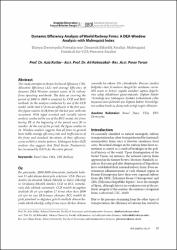Dynamic efficiency analysis of world railway firms: A dea-window analysis with malmquist index
Künye
Kutlar, A, Kabasakal, A, Torun, P. (2015). Dynamic efficiency analysis of world railway firms: A dea-window analysis with malmquist index. Anadolu Üniversitesi Sosyal Bilimler Dergisi, 15 (1), 27-41.Özet
This study attempts to obtain Technical Efficiency (TE),
Allocative Efficiency (AE) and Average Efficiency of
dynamic DEA-Window analysis scores of 31 railway
firms operating worldwide. The data set covering the
period of 2000 to 2009 is analyzed by CCR and BCC
methods. In the analysis conducted by use of the CCR
model, while total 17 firms are efficient in the first year,
this figure reaches to 18 firms for the last year with one
increment. With input oriented and variable return
analysis conducted by use of the BCC model, the firms
having TE at the beginning of the period were 20 in
number. At the end of the period, the figure reaches to
24. Window analysis suggests that all firms in general
have stable average efficiency rate and inefficiencies of
the firms and standard deviations of their efficiency
scores exhibit a similar pattern. Malmquist Index (MI)
analysis also suggests that Total Factor Productivity
has increased by 0.03% for the entire period. Bu çalışmada, 2000-2009 döneminde faaliyette bulunan 31 adet dünya demiryolu şirketinin VZA- Pencere
Analizi ile dinamik Teknik Etkinlik ve Tahsis Etkinliği
ve Ortalama Etkinlik skorları CCR ve BCC metotlarıyla elde edilmek istenmiştir. CCR modeli ile yapılan
analizde ilk yıl için toplam 17 firma etkin iken 2009
yılı için bu sayı 18 firmaya çıkmıştır. BCC modeli ile
girdi yönelimli ve değişken getirili analizde dönem başında teknik etkinliğe sahip firma sayısı 20 iken dönem
sonunda bu rakam 24’e çıkmaktadır. Pencere Analizi
bulguları tüm firmaların dengeli bir ortalama verimlilik oranı ve benzer yapıda standart sapma değerlerine sahip olduklarını göstermektedir. Toplam Faktör
Verimliliği için Malmquist Endeksi kullanılarak yıllar
boyunca tüm işletmeler için Toplam Faktör Verimliliğinin sadece binde üç düzeyinde arttığı tespit edilmiştir
Kaynak
Anadolu Üniversitesi Sosyal Bilimler DergisiCilt
15Sayı
1Bağlantı
https://hdl.handle.net/11421/24987Koleksiyonlar
- Cilt.15 Sayı.1 [12]


















